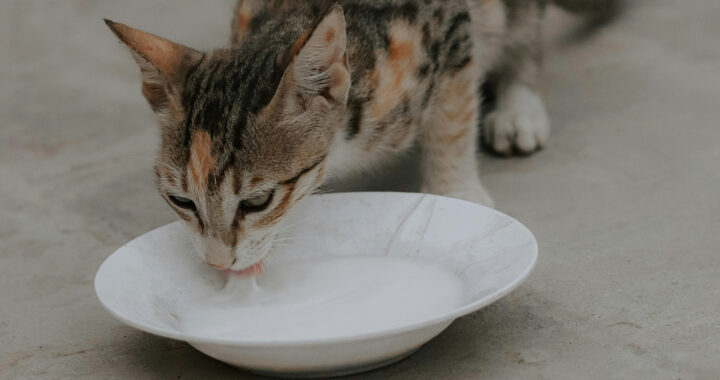Goat milk has been marketed for domestic cats as an alternative to cow milk and as an additional supplement that can be added to their regular diet. Some off-label brands sell reformulated goat milk products with enhanced nutrient profiles and added prebiotics and probiotics. However, while most cats love its taste, it is not a perfect food.
Pros: Recognized Benefits of Goat Milk For Cats
What makes goat milk generally suitable for cats is its lower lactose content compared to milk from cows. Note that most adult cats are lactose intolerant. This means that they cannot properly break down and digest the sugar lactose. Lactose intolerance leads to digestive bloating and more serious digestive issues like diarrhea and vomiting.
Goat milk also has smaller fat globules. In cow milk, fat globules are larger and surrounded by a thicker membrane, which requires more digestive effort to break down. Goat milk, on the other hand, has naturally smaller fat globules and a softer curd formation. This makes it easier to digest and is ideal for cats with ongoing digestive issues.
It also contains good amounts of calcium, phosphorus, vitamin A, pyridoxine or vitamin B6, niacin or vitamin B3, and protein from whey. Raw goat milk has beneficial enzymes. Fermented variants have probiotics. Some are enriched with other nutrients. This makes goat milk ideal for cats in a temporary liquid diet or as toppers in solid food.
Cons: Potential Downsides of Goat Milk For Cats
Goat milk still contains lactose. A comparative nutrient profile of goat milk and cat milk revealed that the former has 4.13 grams of lactose per 100 grams, while the latter has 4.52 grams per 100 grams. This means that goat milk is not ideal for cats with moderate to severe lactose intolerance because it only has about 8.7 percent less lactose.
Some pet owners might be tempted to force-feed sick cats with goat milk as first aid until proper medical attention is given. This could be true if their pets refuse to eat solid food. However, due to its substantial lactose content, it is not advisable to feed stressed or weakened cats with anything that can upset their stomach and worsen their condition.
Goat milk is also not a substitute for cat milk and cat food. Unweaned kittens are also advised to consume commercial kitten milk. Cats are also obligate carnivores. This means that they can only get their full nutritional needs from a meat diet. Raw milk from goats or other animals is also not advisable due to the risk of bacterial contamination.
FURTHER READINGS AND REFERENCES
- Han, B., Sun, J., Gu, X., Wang, J., Wang, X., Tao, H., Wang, Z., Liu, J. 2025. “The Prebiotic Potential of Lactobin and Glucans Combined With Goat’s Milk in Cats.” Canadian Journal of Veterinary Research. 89(1): 36-42. PMID: 39744467
- Stergiadis, S., Nørskov, N. P., Purup, S., Givens, I., and Lee, M. R. F. 2019. “Comparative Nutrient Profiling of Retail Goat and Cow Milk.” Nutrients. 11(10): 2282. DOI: 3390/nu11102282
